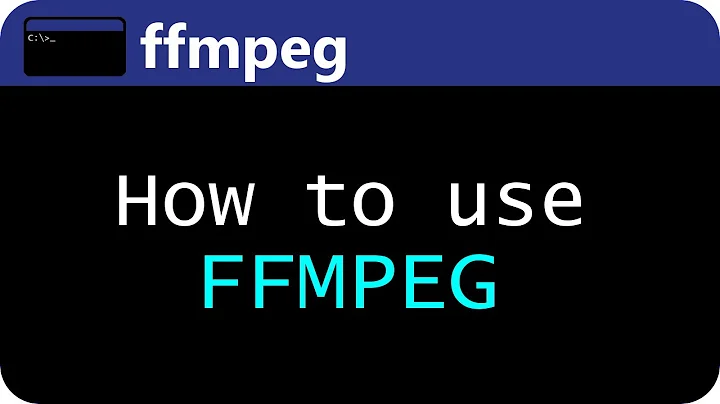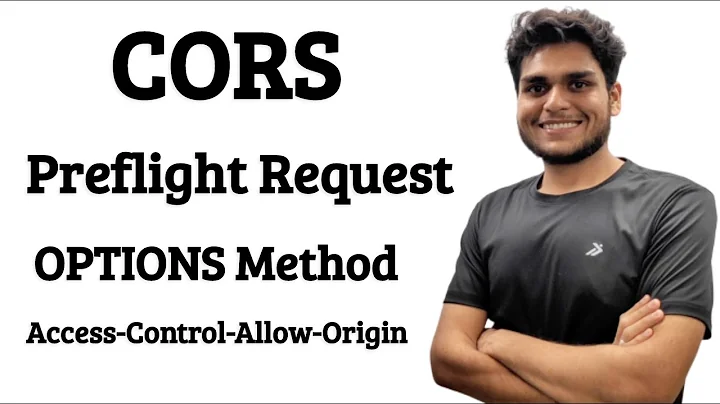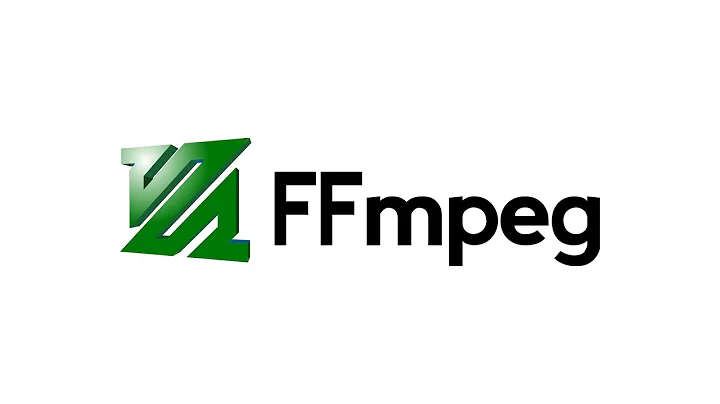ffmpeg - How to pass http headers?
Solution 1
Short Answer
Make sure you're using the latest ffmpeg, and use the -user-agent option.
Longer Answer
For debugging, I setup a BaseHTTPSever running at 127.0.0.1:8080 with do_GET() as:
def do_GET(self):
try:
f = open(curdir + sep + self.path, 'rb')
self.send_response(200)
self.end_headers()
print("GET: "+ str(self.headers))
self.wfile.write(f.read())
f.close()
return
except IOError:
self.send_error(404,'File Not Found: %s' % self.path)
With that running, this enabled me to run your command like:
ffmpeg \
-y \
-timeout 5000000 \
-map 0:0 \
-an \
-sn \
-f md5 - \
-headers "User-Agent: Mozilla/5.0 (Windows NT 6.1; WOW64) AppleWebKit/537.36 (KHTML, like Gecko) Chrome/46.0.2490.80 Safari/537.36" \
-headers "X-Forwarded-For: 13.14.15.66" \
-i "http://127.0.0.1:8080/some_video_file.mp4" \
-v trace
When I do this, I see the following relevant output from ffmpeg:
Reading option '-headers' ... matched as AVOption 'headers' with argument 'User-Agent: Mozilla/5.0 (Windows NT 6.1; WOW64) AppleWebKit/537.36 (KHTML, like Gecko) Chrome/46.0.2490.80 Safari/537.36'.
Reading option '-headers' ... matched as AVOption 'headers' with argument 'X-Forwarded-For: 13.14.15.66'.
On the server, I saw:
User-Agent: Lavf/56.40.101
X-Forwarded-For: 13.14.15.66
So it looks like ffmpeg is setting it's own. But there is an option -user-agent to ffmpeg, and when I replaced -headers "User-Agent: <foo>" with -user-agent "<foo>", I then did see it too on the server, alongside the X-Forwarded-For header:
User-Agent: Mozilla/5.0 (Windows NT 6.1; WOW64) AppleWebKit/537.36 (KHTML, like Gecko) Chrome/46.0.2490.80 Safari/537.36
Last note. There are lots of discussions around headers bugs in trac for ffmpeg. What I have observed above (that essentially it is working, perhaps with a small command change) was with a fairly recent version:
ffmpeg version 2.8.1 Copyright (c) 2000-2015 the FFmpeg developers
built with gcc 4.8 (Ubuntu 4.8.4-2ubuntu1~14.04)
configuration: --enable-libx264 --enable-gpl --prefix=/usr/local --enable-shared --cc='gcc -fPIC'
libavutil 54. 31.100 / 54. 31.100
libavcodec 56. 60.100 / 56. 60.100
libavformat 56. 40.101 / 56. 40.101
libavdevice 56. 4.100 / 56. 4.100
libavfilter 5. 40.101 / 5. 40.101
libswscale 3. 1.101 / 3. 1.101
libswresample 1. 2.101 / 1. 2.101
libpostproc 53. 3.100 / 53. 3.100
So, your next move might be make sure you have the latest version of ffmpeg.
Solution 2
Well, ffmpeg manual says to split multiple http-headers by CRLF. The problem is that you overwrite your first "-header" argument with the second "-header" as there can be only one "-header" argument.
For your example, you need to join User-Agent and X-Forwarded into one argument by valid CRLF like this:
-header "User-Agent: Mozilla/5.0 (Windows NT 6.1; WOW64) AppleWebKit/537.36 (KHTML, like Gecko) Chrome/46.0.2490.80 Safari/537.36"$'\r\n'"X-Forwarded-For: 13.14.15.66"$'\r\n'
Solution 3
For set x:1 and y:2 for header ffmpeg request, use this:
ffmpeg -headers $'x:1\r\ny:2\r\n' -i 'http://sample.com' -y 'sample.mp4' -v debug
Result:
[http @ 0x358be00] Setting default whitelist 'http,https,tls,rtp,tcp,udp,crypto,httpproxy'
[http @ 0x358be00] request: GET / HTTP/1.1
User-Agent: Lavf/57.76.100
Accept: */*
Range: bytes=0-
Connection: close
Host: example.com
Icy-MetaData: 1
x:1
y:2
Related videos on Youtube
Lizozom
Updated on January 18, 2020Comments
-
Lizozom over 4 years
I need to pass http headers (user agent and ip) to an ffmpeg command.
I use the following command:
ffmpeg -y -timeout 5000000 -map 0:0 -an -sn -f md5 - -headers "User-Agent: Mozilla/5.0 (Windows NT 6.1; WOW64) AppleWebKit/537.36 (KHTML, like Gecko) Chrome/46.0.2490.80 Safari/537.36" -headers "X-Forwarded-For: 13.14.15.66" -i "http://127.0.0.1"And I run a local node.js server to see the headers I get:
'use strict'; var express = require('express'); var server = express(); server.all('/*', function(req, res) { console.log(JSON.stringify(req.headers)); res.sendFile('SampleVideo_1080x720_1mb.mp4', {root: '.'}); }); server.listen(80);I keep getting an error saying "No trailing CRLF found in HTTP header." and the request is stuck.
If I drop the headers - everything works normally.
I also tried putting both headers in one string, but any line breaking character I used (\r\n, \r\n, etc.) didn't work.
Can someone help me figure out how to write this command correctly with the headers included?
-
 Jameson over 8 yearsJust curious: did you also try using two separate
Jameson over 8 yearsJust curious: did you also try using two separate-headers "<foo>\r\n"options, each with their own\r\nat the end of the option argument strings? -
Lizozom over 8 yearsYes. It didn't work. I think I tried the full matrix of duplicating slashes, joining headers, etc.
-
 Jameson over 8 yearsWhat specifically is the issue you are seeing with sending them? What does the receiver get?
Jameson over 8 yearsWhat specifically is the issue you are seeing with sending them? What does the receiver get? -
Lizozom over 8 yearsActually I just set up a small local server to test - and it seems I am never able to send any headers what so ever (even if it is just one header)
-
Lizozom over 8 yearsMy goal is just to calculate the md5 of a video file, so this is pretty much what I need from this command. I ran trace like you did, but I don't see my headers being sent on the request.
-
shellter over 8 yearscan't you use the
md5program? Good luck. -
Lizozom over 8 years@shellter - my code obviously does more than just an md5 calculation. This is just the first command in the flow.
-
shellter over 8 yearsyou wrote "My goal is just to calculate the md5 of a video file". Good luck.
-
arturn over 2 yearsJust one more question... Is there any way to remove some of the defaults headers? For example, by default, it adds a 'Range: bytes=0-' header, but it's generating me a '406 Not acceptable' response.
-
-
 Jameson over 8 years@shellter awesome glad it helps!
Jameson over 8 years@shellter awesome glad it helps! -
Lizozom over 8 years@Jameson, the user agent worked for me, but when i'm trying to set up the ip - I'm still getting the "No trailing CRLF found in HTTP header." error
-
Lizozom over 8 yearsUpgrading the ffmpeg version solved the second issue. I'm accepting the answer.
-
 Jameson over 8 years@Lizozom awesome, glad we got it!
Jameson over 8 years@Lizozom awesome, glad we got it! -
kampsj over 8 yearsHere is example commands for any HTTP header. jokecamp.com/blog/passing-http-headers-to-ffmpeg
-
Luca Steeb about 7 yearsIn a new version ffmpeg says that user-agent ist deprecated and user_agent should be used instead.
-
cirrus almost 4 yearsIt seems the order is also important. If you put -i before -headers they'll be ignored. -headers first works well.
-
Fthr over 3 yearsfor user agent u need to use -user_agent options to make it work precisely



![1. [ ffmpeg ] Cài đặt ffmpeg, cài đặt môi trường - công cụ cắt, nối video nhanh nhất](https://i.ytimg.com/vi/5gfdH5tg0P0/hqdefault.jpg?sqp=-oaymwEcCOADEI4CSFXyq4qpAw4IARUAAIhCGAFwAcABBg==&rs=AOn4CLCaLRVk4FX2bDTr2p4kCT_TtBdhxg)
![2. [ ffmpeg ] Convert video - Đổi đuôi video , change bitrate - ffmpeg full course](https://i.ytimg.com/vi/X80F72zIK6k/hq720.jpg?sqp=-oaymwEcCNAFEJQDSFXyq4qpAw4IARUAAIhCGAFwAcABBg==&rs=AOn4CLClXoDgesO9va3oLCg6zDCPh3_fWQ)






